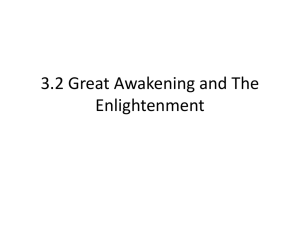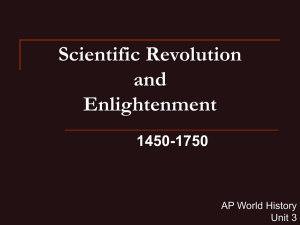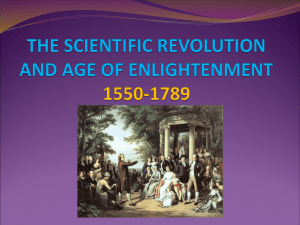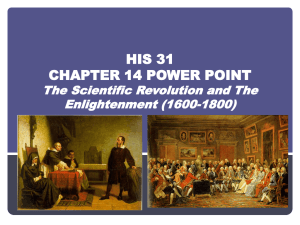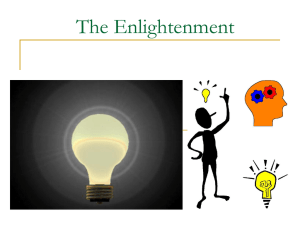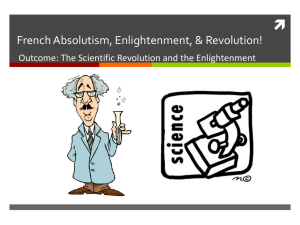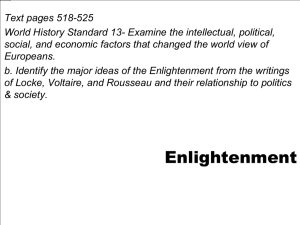Enlightenment, social contract, John Locke, natural rights
advertisement
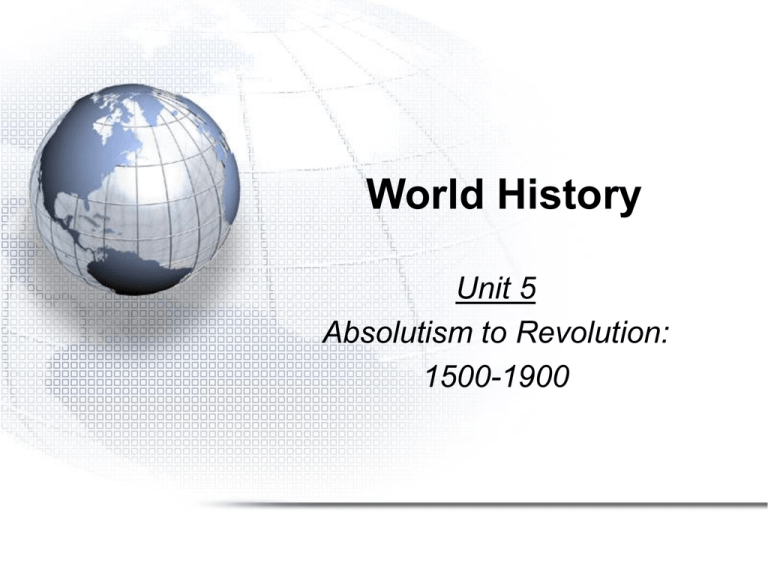
World History Unit 5 Absolutism to Revolution: 1500-1900 Chapter 22 Enlightenment and Revolution Section 1 The Scientific Revolution The Scientific Revolution • • • • • • Objectives To list the circumstances that led to the Scientific Revolution. To summarize the development of the heliocentric theory and explain why it led to conflict. To describe the scientific method and show how Bacon and Descartes advanced it. To explain Newton’s law of gravity. To describe the importance of the scientific method in different fields. Vocabulary: Scientific Revolution, Nicolaus Copernicus, heliocentric theory, Johannes Kepler, Galileo Galilei, scientific method, Francis Bacon, Rene Descartes, Isaac Newton The Roots of Modern Science Scientific Revolution – new way of thinking about the natural world • Medieval View – geocentric theory – Greeks, Christianity – observation & questioning • Arabic translations • scientific method – exploration • new worlds • new people – new observations vs. ancient beliefs The Scientific Revolution Astronomy – Nicolaus Copernicus • 25 years of study • heliocentric theory – sun-centered universe • published after his death - 1543 – Johannes Kepler - 1601 • mathematician • Tycho Brahe’s data – elliptical orbits • proved Copernicus correct – Galileo Galilei • law of the pendulum • fixed and predictable rates • Starry Messenger – 1610 – house arrest until 1642 The Scientific Revolution Scientific Method – logical procedure for gathering and testing ideas – Francis Bacon • English politician / writer • critical of Aristotle thinkers • empiricism – experimental method – Rene Descartes • French mathematician – analytical geometry • prove w/ mathematics and logic • skepticism – “I think, therefore I am” The Scientific Revolution Isaac Newton – English mathematician/physicist – law of universal gravitation • Copernicus, Kepler, Galileo • single theory of motion • attraction depends on mass Scientific Instruments – microscope, barometer, thermometer – Gabriel Fahrenheit vs. Anders Celsius Medicine – – “On the Fabric of the Human Body” (1543) Edward Jenner – smallpox vaccine Chemistry – Robert Boyle • founder of modern chemistry • Boyle’s Law – volume, temperature, pressure of gas The Scientific Revolution • • • • • • • • • • • Objectives To list the circumstances that led to the Scientific Revolution. Medieval geocentric view; new discoveries challenge old thinking To summarize the development of the heliocentric theory and explain why it led to conflict. Scientists use observation and math; Galileo’s observations support; heliocentric ideas conflict teaching of church and state To describe the scientific method and show how Bacon and Descartes advanced it. Logical gathering and testing; Bacon – conclusions based on observations; Descartes – doubt unless proven by reason To explain Newton’s law of gravity. Same physical laws govern earthly and heavenly motions To describe the importance of the scientific method in different fields. New tools > precise observations; anatomy > body/disease understanding; chemistry > understanding of matter Vocabulary:Scientific Revolution, Nicolaus Copernicus, heliocentric theory, Johannes Kepler, Galileo Galilei, scientific method, Francis Bacon, Rene Descartes, Isaac Newton Chapter 22 Enlightenment and Revolution Section 2 The Enlightenment in Europe The Enlightenment in Europe • • • • • Objectives To explain Hobbe’s and Locke’s views on government. To list important Enlightenment philosophers and concepts. To describe women’s contributions to the Enlightenment. To explain the impact of the Enlightenment on Western civilization. Vocabulary: Enlightenment, social contract, John Locke, natural rights, philosophe, Voltaire, Montesquieu, separation of powers, Jean Jacques Rousseau, Mary Wollstonecraft The Enlightenment in Europe Enlightenment – Age of Reason - 1650s • Thomas Hobbes – British political thinker – humans selfish and wicked • English Civil War – social contract • people give up rights • law and order • John Locke – British political thinker – humans are reasonable • Glorious Revolution – natural rights – self-government • life, liberty, and property The Enlightenment in Europe Philosophes – 1750s French social critics • Voltaire – satire against church and state – twice was jailed • Montesquieu – political liberty – “On The Spirit of Laws” - 1748 • separation of powers • Rousseau – individual freedom – civilization corrupts goodness – “Social Contract” • direct democracy • Beccaria – “On Crimes and Punishment” • laws for social order • punishment fits the crime The Enlightenment in Europe Women • Mary Wollstonecraft – “A Vindication of the Rights of Women” - 1792 • political participation • equal education • salons – social gatherings Impact of Enlightenment – belief in progress • reason solves social problems – more secular outlook • superstition, fear, intolerance – importance of individual • government by individuals The Enlightenment in Europe • • • • • • • • • Objectives To explain Hobbe’s and Locke’s views on government. Hobbes-people need strong govt. to keep order; Locke-people have natural ability to govern themselves To list important Enlightenment philosophers and concepts. Voltaire-fights intolerance thru writing; Montesquieu-governments power divided; Rousseau-govt. formed by agreement of free people; Beccaria-promote criminal justice; Concepts-reason, nature, happiness, progress, liberty To describe women’s contributions to the Enlightenment. Writers argue for more education and equality; ideas spread thru social gatherings To explain the impact of the Enlightenment on Western civilization. Human reason solves social problems; more secular outlook; importance of individual Vocabulary: Enlightenment, social contract, John Locke, natural rights, philosophe, Voltaire, Montesquieu, separation of powers, Jean Jacques Rousseau, Mary Wollstonecraft Assessment 1) The Age of Reason 2) He thought humans selfish / wicked 3) Agreement where people give up rights in exchange for law and order 4) He thought people reasonable with the ability of govern themselves 5) Name the 3 “natural rights” 6) Term used to describe French social critics 7) He used satire against the church and government 8) He believed in separation of powers 9) He argued that civilization corrupts people’s natural goodness 10) This writer thought men and women should have equal political rights 1) Enlightenment 2) Thomas Hobbes 3) social contract 4) John Locke 5) life, liberty, and property 6) philosophes 7) Voltaire 8) Montesquieu 9) Rousseau 10) Mary Wollstonecraft Chapter 22 Enlightenment and Revolution Section 4 American Revolution: The Birth of a Republic The Birth of a Republic • • • • Objectives To describe the American colonies in the late 1700s. To list events that led to the American Revolution. To explain the Enlightenment’s influence on American government. Vocabulary: Declaration of Independence, Thomas Jefferson, checks and balances, federal system, Bill of Rights The Birth of a Republic King George III - 1760 – Constitutional Monarchy – American Colonies • population growth – 1700: 250K - 1770: 2.15M • economic prosperity • new sense of identity – loyal British subjects – Navigation Acts - 1660s • profitable mercantilism • smuggling – French and Indian War - 1763 • huge debt • Stamp Act - 1765 – all printed material – taxation w/o representation The Birth of a Republic Hostility – ‘Boston Tea Party’ - 1773 • British occupation – 1st Continental Congress - 1774 • Boston protest – 2nd Continental Congress - 1775 • Lexington and Concord - Apr 19 • raise an army Enlightenment Ideals – same political rights – broken social contract – Declaration of Independence - 1776 • Thomas Jefferson • John Locke’s ideas The Birth of a Republic Articles of Confederation - 1781 – 1st U.S. Constitution – representative republic • legislature only (Congress) • no tax or trade power – Shay’s Rebellion - 1787 Constitutional Convention - 1787 – revise Articles of Confederation – “2nd American Revolution” • new system of government • 3 branches – checks and balances • federal system – Bill of Rights • individual freedoms The Birth of a Nation Objectives • To describe the American colonies in the late 1770s. – Huge population growth; Thriving economies; Sense of identity; Limited trade opportunities; New British taxation • To list events that led to the American Revolution. – – – – – 1765 - Stamp Act -Taxation w/o representation 1773 - Boston Tea Party - trade monopoly 1774 - 1st Continental Congress - Boston protest 1775 - 2nd Continental Congress - discuss next steps 1775 - Lexington and Concord - vote to raise army • To explain the Enlightenment’s influence on American government. – Political equality with British – John Locke’s 1690 Treatise – Montesquieu’s “Separation of Powers” • Vocabulary: Declaration of Independence, Thomas Jefferson, checks and balances, federal system, Bill of Rights Assessment 1) He was English King in 1760 2) This war left England with huge debt 3) This Act taxed all printed material 4) This 1773 ‘party’ led to British occupation of Boston 5) 1774 meeting to determine what to do about Boston occupation 6) While the 2nd Continental Congress met, fighting broke out here 7) He wrote the Declaration of Independence 8) His ‘ideas’ were used in the D.O.I. 9) The 1st U.S. Constitution 10) System where each branch of govt. checks the actions of the others 1) George III 2) French and Indian War 3) Stamp Act 4) Boston Tea Party 5) 1st Continental Congress 6) Lexington and Concord 7) Thomas Jefferson 8) John Locke 9) Articles of Confederation 10) checks and balances
